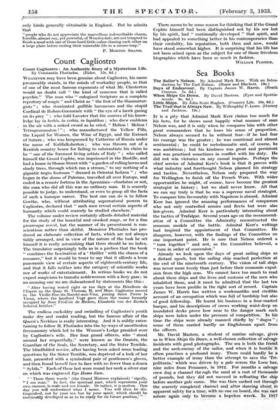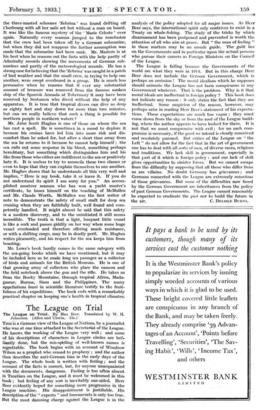Sea Books
The Sailor's Nelson. By Admiral Mark Kerr. With an Intro. duction by The Earl Nelson. {Hurst and Blackett. 18s.) Days of Endeavour. By Captain James W. Harris. (Heath
Cranton. 75. 6d.)
IT is a pity that Admiral Mark Kerr claims too much for his hero, for he shows most happily what manner of man Nelson was, and it is only when he compares him with other great commanders that he loses his sense of proportion. Nelson always seemed to be without fear—if he had fear his courage was the greater ; he was emotional and almost sentimental ; he could be melodramatic and, of course, he was ambitious ; but his kindness was great and persistent and was practised sometimes in conflict with his duty. He did not win victories on any casual impulse. Perhaps the chief service of Admiral Kerr's book is that it proves with what industry and forethought Nelson planned his strategy and tactics. Nevertheless, Nelson only prepared the way for Wellington to finish off the French Wars. With wider opportunities he might, of course, have become the greatest strategist in history ; but we shall never know. All that we can say truly is that he was a supreme naval strategist. To compare him favourably with Napoleon is absurd. Admiral Kerr has ignored the amazing performances of conquerors who not only controlled armies and fleets but were also law-givers. Admiral Kerr is particularly interesting about the tactics of Trafalgar. Several years ago on the recommend- ation of a Committee the Admiralty reconstructed the museum models of the battle. Admiral Kerr's writings had inspired the appointment of that Committee. He disagrees, however, with the findings of the Committee on one important point. He is sure that Nelson ordered a " turn together " and not, as the Committee believed, a " turn in order of succession."
Already we look upon the days of great sailing ships as a distant epoch, but the sailing ship reached perfection at the end of the nineteenth century. The vision of tall ships was never more lovely than just before their economic expul- sion from the high seas. We cannot have too much to read about these ships and the lives and customs of the men who inhabited them, and it must be admitted that the last ten years have been prolific in the right sort of record. Captain James W. Harris has written a workmanlike and credible account of an occupation which was full of hardship but also of good fellowship. He learnt his business in a four-masted barque, and his descriptions of crews working waist-deep on inundated decks prove how near to the danger mark such ships were laden under the pressure of competition.' In his time the ships were already manned chiefly by " dagin " ; some of them carried hardly an Englishman apart from the officers.
Mr. David Masters, a student of marine salvage, gives us in When Ships Go Down, a well-chosen collection of salvage incidents with good photograph& The sea is both the friend and the arch-enemy of the sailor, and when it is hostile it often practises a profound irony. There could hardly be a better example of irony than the attempt to save the `Tri- politania,' which was driven by a gale across the Looe bar, nine miles from Penzance, in 1912. For months a salvage crew dug a channel theiugh the sand at a cost of thousands of pounds, but they did not succeed in refloating the ship before another gale came. She was then sucked out through the scarcely completed channel and after dancing about in apparent safety for a time, with no one on board, she was cast
ashore again only to become a hopeless wreck. In 1917 . .
the three masted schooner Sebrina ' was found drifting off Cherbourg with all her sails set but without a man on board. It was like the famous mystery of the ' Marie Celeste' over again. Naturally every seaman jumped to the conclusion that the crew had been taken off by a German submarine, but when they did not reappear the further assumption was made that the submarine had been sunk. Mr. Masters is at his best when he reasons out the facts with the help partly of Admiralty records showing the movements of German sub- marines and partly of the meteorological records. He has a strong case for believing that the `Zebrina' was caught in a patch of bad weather and that the small crew, in trying to help one another, were swept overboard in a group. He is much less persuasive when he reasons that if ever any substantial amount of treasure was removed from the famous sunken ship of the Spanish Armada at Tobermory it may have been removed by Scotsmen who dived without the help of any apparatus. It is true that tropical divers can dive as deep as eighty feet and stay down for more than two minutes, but can we really believe that such a thing is possible for northern people in northern waters ?
Mr. John Scott Hughes is one of those on whom the sea has cast a spell. He is sometimes in a mood to deplore it because his cruises have led him into more risk and dis- comfort than he asked for, but after a short time away from the sea he returns to it because he cannot help himself ; the sea calls out some response in his blood, something perhaps hereditary, but something which distinguishes him and his like from those who either are indifferent to the sea or positively hate it. It is useless to try to reconcile these two classes or even to hope that they can explain themselves to one another. Mr. Hughes shows that he understands all this very well and implies, " Here is my book, take it or leave it. If you do not understand its spirit I am sorry for you." An accom- plished amateur seaman who has won a yacht master's certificate, he bases himself on the teaching of McMullen and Mr. Claude Worth. McMullen was the first writer of note to demonstrate the safety of small craft for deep sea cruising when they are faithfully built, well found and com- petently handled. It might almost be said that this safety is a modern discovery, and to the uninitiated it still seems incredible. The truth is that a light, buoyant little vessel is like a cork and passes giddily on her way when some huge vessel overloaded and therefore offering much resistance, or with a shifting cargo, may be in deadly peril. Mr. Hughes writes pleasantly, and his respect for the sea keeps him from boasting.
Mr. Lowe's book hardly comes in the same category with the sea-going books which we have mentioned, but it may be included here as he made long sea passages as a collector of birds and animals for the British Museum. He is one of that growing army of collectors who place the camera and the field notebook above the gun and the rifle. He takes us from the Rocky Mountains, through tropical Africa, Mada- gascar, Burma, Siam and the Philippines. The many appellations tower in scientific literature testify to the fruit- fulness of his expeditions. The book ends with a remarkably practical chapter on keeping ones health in tropical climates.





































 Previous page
Previous page